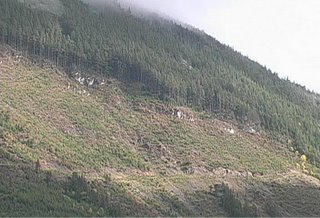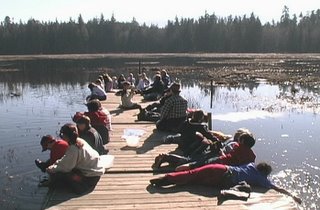 Countless times, over the course of the past year that I have been writing this column, people have thanked me for bringing up issues about the environment and the destructive forces that threaten to destroy the planet. Complete strangers encourage me to continue writing this column because they enjoy learning about subjects that rarely see the light of day. I humbly thank those people for letting me know that they care.
Countless times, over the course of the past year that I have been writing this column, people have thanked me for bringing up issues about the environment and the destructive forces that threaten to destroy the planet. Complete strangers encourage me to continue writing this column because they enjoy learning about subjects that rarely see the light of day. I humbly thank those people for letting me know that they care.Provincial government ministers, MLAs, city councilors, and civil servants have provided input regarding my column by contacting the editor of the PQ News. At times they question details and provide their point of view, but they do not provide the public with the opportunity to become more informed or to participate in solutions to the problems that I have identified.
A case in point is the Lost Trails Wetlands in Dashwood where the sale of 300 acres of land owned by the public will close next week with little to no public consultation by Land and Water British Columbia. Announcements, made when decisions have already been made do not allow for issues to be discussed in a fair and meaningful manner. For information regarding similar deals around the province check out: www.lwbcwatch.org
I have noticed a trend with regards to the environment since the BC Liberals came to power. Several sensitive areas of ecological significance, that have been identified and earmarked for protection by biologists and other professionals, were allowed to be partially destroyed before any protection was implemented. In the local area I know of at least one marsh, an old growth forest, and the riparian zone along a river that have all suffered this fate.
A very disturbing concept was expressed to me by a government employee whom I cannot name because he or she might be fired. In order to protect a piece of land as park, wildlife corridor, or ecological reserve a price must be negotiated. To meet budgetary constraints, imposed by the BC Liberals, the private corporations that own the land offer to reduce the market value. This generally means that valuable assets will be removed from the equation.
The result is that sensitive ecosystems are logged and the majority of significant trees are removed by the company before the government pays market value for the land and names it a park. Since the land is private, the logs are exported. The government then makes an announcement to the public that they have saved and protected a piece of nature for people to enjoy, calling it a corporate gift. Millions of tax payer dollars are spent on lands where the natural wildlife habitat has already been significantly compromised.
Such is the case with the recent park expansion in Cathedral Grove where BC taxpayers put out $2 million in cash and $3 million worth of tax credits to American logging giant Weyerhaeuser to buy 140 hectares of land that has been logged extensively. WLAP Minister Bill Barisoff called this a Eco-gift. E-mail bill.barisoff.mla@leg.bc.ca
Meanwhile the only remaining stands of old growth Douglas Fir trees outside the park remain in the hands of Weyerhaeuser, who will either log or sell the land to Brascan.
At the same time the BC government is selling lands that the public believed to be protected as parks, while buying land that has been logged to make up for the short-fall in parks. The public outcry after the fact can not repair the damage, therefore people must stand up for their concerns before it is too late.
The first statement at http://lwbc.bc.ca is; “Land and Water British Columbia Inc. manages the allocation of Crown land and water resources on behalf of the Government of British Columbia and its constituents.”
People walk on the land and drink the water. It has been my experience that the public is concerned about the future of the planet. Many people understand that the quality of life enjoyed by humanity is very much connected with the well-being of the natural world around us. Corporations are not human beings, but they can be stopped. Land and Water British Columbia may be a corporation but the people of this province own it.
